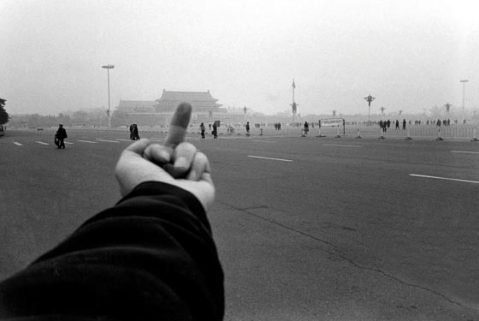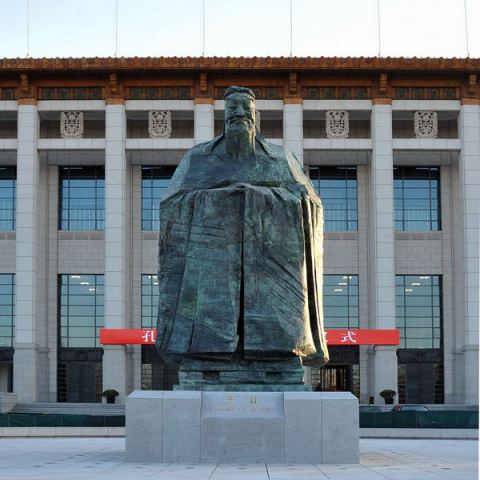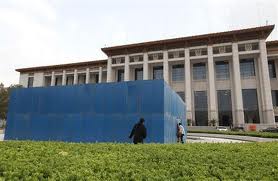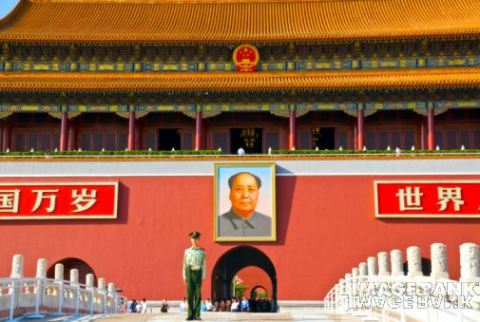What do Chinese artist-activist Ai Weiwei and the iconic sage Confucius have in common? They've both recently disappeared from public sight without explanation.
Ai went missing on April 3. Only on April 7 did government officials acknowledge that he had been detained as he was preparing to board a flight for Hong Kong. A few days later, reason for the detainment appeared briefly on the Xinhua's wire service before it too disappeared: Ai was under investigation for "suspected economic crimes."
Sure, "economic crimes" is a possible reason. More likely, Party leaders have grown tired of his in-your-face political activism -- directed at the Party. The photo series of his outstretched middle finger, taken in Tiananmen Square and aimed at the Tiananmen Gate, atop of which Chairman Mao announced the establishment of the People's Republic 60 years ago, no doubt rankled some Party higher-ups.

If the photo series didn't, his unrelenting public campaign to hold government officials accountable for the shoddily-constructed schools that collapsed in the 2008 earthquake in Chengdu, killing more than 5000 innocent children, did. Then there's his ongoing, again very public, Twitter-driven rant denouncing the government's repression of freedom of expression and human rights.
Confucius' disappearing act remains more mysterious. Only three months ago, on January 12, authorities placed a 17-ton, 30-foot statue of the sage in the very square in which Mao declared the new People's Republic in 1949. Not just in the very square, but positioned at the northern gate of the National Museum of China, a spot from which Confucius could gaze on the massive 15' x 25' portrait of Mao that hangs just above the Tiananmen Gate. It was, from the beginning, an uneasy relationship.

After all, Mao's contempt for the "feudal" Confucius, had been deep and enduring, resulting in a massive anti-Confucius campaign that swept through the country during the Cultural Revolution of the 1960s-70s, bringing ruin to temples, books and historical landmarks associated with the Confucian tradition. Safe to say then that Confucius' sudden, unannounced appearance across the square from Mao's gaze was not a welcome sight to the Chairman or his dedicated followers. To them -- and many observers -- it represented the CCP's rehabilitation of Confucius and his teachings and the Party's further distancing from Maoism.
But where authorities did, after a few days, explain the "disappearance" of Ai Weiwei, none has yet been given for the removal of Confucius late Wednesday night, April 20. Visitors to the square on Thursday, hoping to get a glimpse of him, found only an empty pit cordoned off by blue corrugated iron fencing. No sign, no explanation.

We can assume, I think, that he is not under investigation for "suspected economic crimes." We can assume too that he never gave the finger to the Tiananmen Gate, in the direction of Mao's portrait; or complained that the corrupt or irresponsible officials were in part responsible for the deaths of schoolchildren in Chengdu; or criticized the regime for its refusal to open up more political and social space for the Chinese people to express themselves. (Though the specter of his doing so may have been very real to some.)
So, why the disappearance? We simply don't know for sure. One museum worker is reported to have said that the statue's placement outside of the museum facing Tiananmen Gate had been temporary and was being moved to an out-of-the-way sculpture garden inside the museum. Seems plausible, but why not a more formal announcement to that effect, from either authorities at the museum or in the government? And, if that is the case, what was the point, given the massive construction efforts and costs involved, in placing it in the symbolically sacred square in the first place -- the significance of which certainly wouldn't have been lost on the Beijing leadership?
Chinese leaders today are in a state of high anxiety. The turmoil in the Mideast has them agitated and overly vigilant. It seems too that there's a tug of war within the leadership itself, between hardliners (like Wu Bangguo) and more reform-minded liberals (like Premier Wen Jiabao), with the hardliners, for the time being, ascendant. In any event, the Beijing government doesn't appear to be in the mood to countenance any threats to its authority -- and to the authoritarian principles that undergird Communist Party rule. Confucius' very presence in the square may have been perceived by many as diminishing Mao (e.g., Maoflag.net), the "Great Helmsman" of the Chinese revolution and the continued source of much of the CCP's legitimacy today.
An emerging "red culture" movement, promoted most famously by rising political star Bo Xilai, Party Secretary of Chongqing municipality, further indicates that Mao and hardline descendants have not surrendered to the reform agenda inaugurated three decades ago by Deng Xiaoping. They are resisting what they view as the loosening of CCP control over Chinese society. At the heart of this "red culture" movement, dubbed by some a "New Maoism," is the celebration of the achievements of the Chinese Communist Party, a reminder to the Chinese people that it is the steady, guiding hand of Mao and the Party that is responsible for the country's rising fortunes since 1949.
In Chongqing (pop. 30 million), Party Secretary Bo has ordered Chongqing Television to stop airing soap operas and sitcoms during prime time and to show instead film epics like Marching Forward for the New China and Liberation of the Great Southwest and public service ads; radio stations are expected to broadcast the 36 "red songs" -- selected by the government -- like "Ode to the Motherland," "Without the Communist Party There Would be No New China" and "Fluttering Flag" throughout the day. Reports are that this movement is striking a chord, especially among older people who remember nostalgically the first decades of the People's Republic as a time of social and economic security and equality -- a security and equality largely absent today.
To return to the disappearing Confucius: as the story of perhaps the world's only 17-ton portable statue unfolds, we may learn more about the shifting political winds in China. Or we may find that even then we're still in the dark. Chinese politics can be hard to read. But on the face of it now, it looks to me like Mao has won the recent round in the showdown at Tiananmen.
